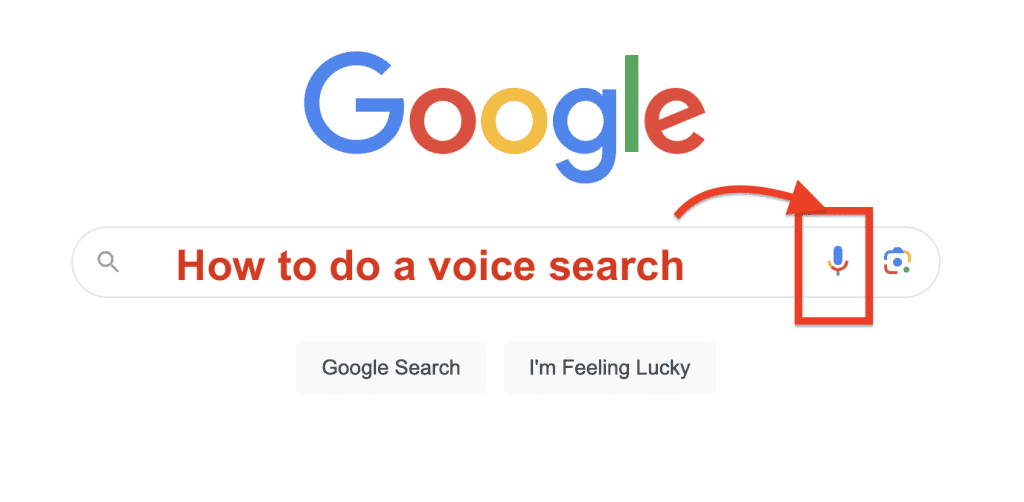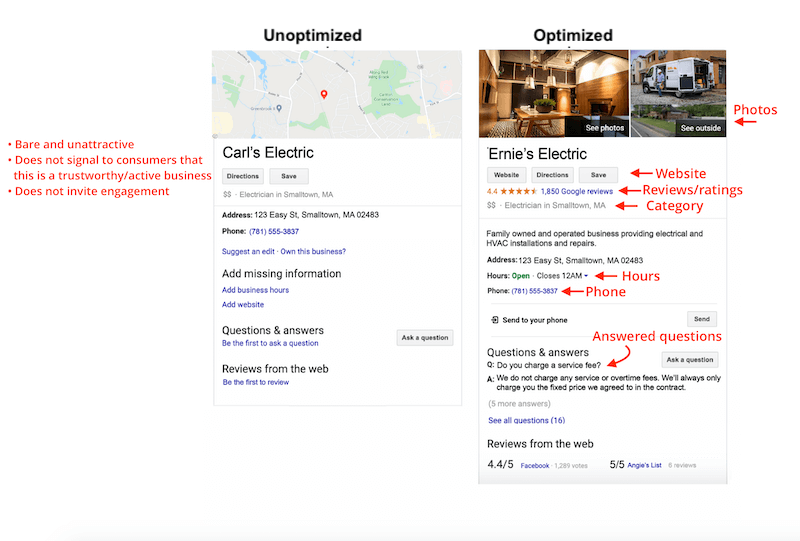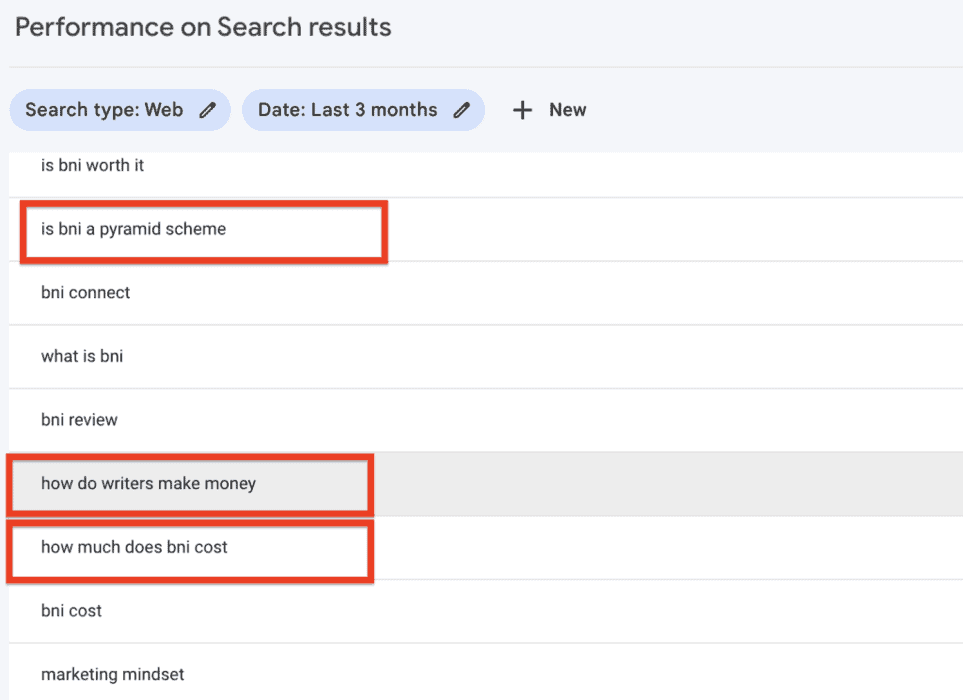In This Article

We’ve been talking about voice search for several years now. And, like most trends, small business owners aren’t keeping up. Don’t let this happen to you. Get on board with Google Voice Search.
As more and more users turn to voice search for convenience and efficiency, it’s important for businesses to optimize their websites for this growing trend. Online searches, especially voice searches, differ significantly from traditional typed queries, requiring a more conversational approach to SEO strategies.
Are you ready to harness the power of Voice Search Google and stay ahead of the competition? Let’s dive into the world of voice search optimization and discover how it can revolutionize your business.
Short Summary
-
Optimize your website for voice search to reach a wider audience and improve local visibility.
-
Utilize conversational keywords, optimize Google My Business listings & implement structured data markup.
-
Stay informed about AI advancements in voice search technology & integrate with IoT devices for new opportunities.
Understanding Google Voice Search

Photo by Matt Botsford on Unsplash
Imagine being able to search the web using only your voice, without the need for typing or clicking. That’s precisely what Google Voice Search offers. The integration of voice search within the Google search bar, highlighted by the microphone icon, allows users to activate voice search on various devices. As an integral part of Google’s search engine, the new Google search app with voice search functionality allows users to conduct hands-free searches by simply speaking their queries into their mobile devices. To get started, simply open the Google app. During the Inside Google Search event, this innovative feature was showcased, highlighting its potential to revolutionize the way we search the internet.
No wonder the Chrome browser has become a game-changer in the world of search engines!
How Google Voice Search Works
So, how does this magical voice search technology work? Google Voice Search uses advanced speech recognition technology to understand and process voice commands. By saying “OK, Google” or “Hey Google,” users can activate the voice search functionality on their devices and start speaking their queries. The technology behind Google Voice Search is not only limited to the Google app, but is also integrated into Google Maps and other Google services, making it a versatile and useful tool for users.
The secret sauce behind Google Voice Search’s accuracy lies in its use of semantic search. This technology helps Google understand the context of users’ queries, enabling it to recognize related questions and provide relevant search results. So, whether you’re looking for the nearest restaurant or asking for directions, Google Voice Search has got your back!
The Growth of Google Voice Search
The popularity of voice search has grown exponentially in recent years. According to Voicebot, 58% of adults using the internet have used voice search at least once in 2019, and 33% have searched in that format every month at the beginning of the same year. According to SemRush, 56% of all searches actually happen on cell phones.
And, of course, there’s the ever-increasing use of hands-free searching and the rise of digital assistants like Google Assistant, Alexa and Siri.
The widespread adoption of Google voice search has significant implications for businesses, especially when it comes to SEO strategies. For instance, 71% of users prefer using voice search over typing, and the majority of “near me” searches come from mobile devices. As voice search continues to gain momentum, it’s essential for businesses to adapt and optimize their websites accordingly.
Benefits of Optimizing for Google Voice Search

Photo by Kenny Eliason on Unsplash
Optimizing your website for voice search comes with a plethora of benefits. For starters, you can reach a wider audience, as more users are turning to voice search for their daily needs. Moreover, optimizing for voice search can help enhance your local search results, making it easier for prospective customers to find your business. Having a voice search strategy is crucial to ensure accurate business information and better performance in voice search results.
But that’s not all! Voice search optimization also enables your website to provide a user-friendly experience. By incorporating conversational keywords and optimizing your Google My Business listings, you can ensure that your website caters to the growing number of voice search users and stays ahead of the competition.
Reaching a Wider Audience
By optimizing your website for voice searches, you can tap into a vast pool of potential customers who prefer voice search to typing. For example, 28% of men and 26% of women use voice-assisted searches on their mobiles. This means that optimizing your website for voice search can help you reach a wider audience and improve your chances of appearing in their search results.
One way to optimize your website for voice search is by including location-specific keywords and phrases in your website content and Google My Business listings. This will ensure that your website is visible to users searching for “near me” queries, which have increased significantly over the past few years.
Enhancing Local Search Results
Local businesses, in particular, can benefit immensely from voice search optimization. As voice search becomes more popular, users are increasingly relying on it to find local businesses and services. In fact, 88% of “near me” searches come from mobile devices, making it crucial for local businesses to optimize their websites for voice search.
Optimizing Google My Business listings is one way to boost visibility in voice search results. By providing accurate and up-to-date information about your business, such as opening hours and contact details, you can improve your chances of appearing in search results when users search for local businesses.
Key Strategies for Voice Search Optimization

Photo by Malte Helmhold on Unsplash
Now that we’ve established the importance of voice search optimization, let’s explore some key strategies to help you get started. From utilizing conversational keywords to optimizing your Google My Business listings, these tactics will ensure that your website is primed for the voice search revolution.
Keep in mind that voice search optimization is an ongoing process. As voice search technology continues to evolve, it’s essential to stay updated on the latest trends and adjust your strategies accordingly. By doing so, you can stay ahead of the competition and provide the best possible experience for your users.
Use Conversational Keywords

When optimizing your website for voice search, it’s crucial to focus on long-tail, conversational keywords. Unlike traditional typed searches, voice search queries tend to be longer and more conversational in nature. By targeting these long-tail keywords, you increase your chances of ranking for voice search queries and showing up high in search results.
To find the best conversational keywords for your website, analyze your voice search performance and identify the most common queries. Then, incorporate these search keywords into your website content in a natural and conversational manner. This approach not only helps with voice search optimization but also makes your webpages sound more authentic and engaging.
Optimize Google My Business Listings

source: WordStream
Another essential strategy for voice search optimization is claiming and optimizing your Google Business Profile. This free service by Google allows you to manage and update your business information, ensuring that it’s accurate and up-to-date. By optimizing your Google Business Profile, you can improve your visibility in voice search results when users search for local businesses.
To optimize your Google Business Profile, ensure that your business information is accurate and complete. This includes your business name, address, phone number, website, and opening hours. Additionally, consider adding high-quality images to your listing to make it more visually appealing and help your business stand out in search results.
Implement Structured Data Markup

Soource: SEMRush
Structured data markup, also known as schema markup, is a powerful tool that can improve your website’s visibility in voice search results. By adding snippets of code to your website, you can provide search engines with additional information about your content, making it easier for them to understand and index your pages accurately.
Implementing structured data markup can also boost your chances of being featured in Google’s coveted “top spot” with an answer card for a question query. By providing search engines with the necessary context, you can improve your voice search rankings and ensure that your content is more accessible to users.
Focus on Mobile Responsiveness
You’ve been hearing how important mobile responsiveness and design is for year. Well, this year it’s more important than ever.
Your customers expect a swift and seamless mobile experience. Google considers the user experience when ranking websites, so if your website isn’t optimized for mobile, it may not rank as highly in search results.
If your website is kind of wonky and not so mobile friendly — don’t worry. Now there are quick mini-mobile websites you can set up in about 10 minutes (I’m not kidding) that will make it much easier for you to grab those Google voice search customers.
-
Are you a content creator looking to monetize your work and maximize your online presence?
Stan.store is the ultimate all-in-one tool that helps creators like you make money online by selling digital products or services alongside your content on social media.
Boost conversions, simplify buying and selling processes, increase email list building, automate calendars and bookings, plus much more!
Treat your content like a business with stan.store – get started now!
We earn a commission if you click this link and make a purchase at no additional cost to you.
-
Pensight is one of the best ways to create a landing page for social media and fill it up with links to the things that you want to share with your followers.
It is a mini web page built into your Instagram and TikTok profiles, making your content clickable and shoppable.
With Pensight, you can customize your text, choose the layout, modify colors, and create a fully-customizable link in bio web page.
Pensight link in bio tool is ideal for small business owners, entrepreneurs, and anyone who wants to make money online selling digital products or services alongside their content on social media.
We earn a commission if you click this link and make a purchase at no additional cost to you.
-
Beacons.ai link in bio tool is ideal for small business owners, entrepreneurs, and anyone who wants to make money online selling digital products or services alongside their content on social media.
With Beacons.ai, creators can create a professional-looking landing page that is easy to customize and monetize.
The best part is, Beacons.ai is totally free to use and provides tons of awesome customization options.
We earn a commission if you click this link and make a purchase at no additional cost to you.
Measuring Voice Search Performance

Photo by Markus Winkler on Unsplash
To ensure that your voice search optimization efforts are paying off, it’s essential to track your performance and identify areas for improvement. By using analytics tools like Google Analytics and Search Console, you can gain valuable insights into how users are engaging with your website and which keywords they’re using to find it.
Analyzing your voice search performance can help you pinpoint what needs improvement. Whether it’s optimizing your content, updating your website’s design, or implementing structured data markup, continuous monitoring and adjustment of your strategies are key to staying ahead in the ever-evolving world of voice search.
Track Voice with Google Search Console
One of the best ways to track your voice search performance is by tracking your data with Google Search Console.

There’s no direct way to see which searches came from voice search. The best way is to look through your queries and look for “natural language” queries.
Update, Optimize, and Improve
Don’t let this new shift toward voice search and AI search overwhelm you. Voice search registration is crucial for enhancing your visibility in this growing field. Start with the basics. Voice search registration is crucial for enhancing your visibility in this growing field. If you’re a local business focus on your “Google My Business” page. Remember, the more you use Google’s features and tools, the more Google will reward you.
Next, review your website content such as blog posts and product descriptions and make sure that you’re using schema and markup. If you’re on WordPress, there’s a plugin for that.
Keep an eye on changes in the voice search landscape and adjust your strategies accordingly. By staying up-to-date with the latest trends and best practices, you can ensure that your website remains competitive and relevant in the ever-evolving world of voice search.
Future Trends in Voice Search Google

Photo by Nigel Tadyanehondo on Unsplash
So what do we have to look forward to? Overall, there is only going to be more voice search in more places.
After looking around, I found the following trends you’ll want to pay attention to:
-
Increased Accuracy: Google’s speech recognition technology is already 95% accurate and this is only getting better.
-
Expansion of Voice-Enabled Digital Assistants: There are just under 2 billion voice assistants – and growing.
-
Advancements in AI and Machine Learning: We’ve already seen AI booming — expect even more of that.
-
Evolution of SEO Practices: SEO is already changing with AI tools selecting the closest answer. Expect voice search to increase the use of AI as an insight gatherer.
-
Rising Adoption of Voice Search: It’s estimated that approximately half of all searches on Google are conducted via voice. The increasing accuracy of voice search technology is contributing to its growing adoption.
-
Personalized Queries: Personal queries are becoming increasingly popular as users seek specific information such as the location of the nearest business or the best product to suit their particular needs.
Integration with IoT Devices
The Internet of Things (IoT) is set to revolutionize the way we interact with everyday objects, and voice search is no exception. As voice search becomes more integrated with IoT devices, its usage will likely expand beyond traditional search engines and become an integral part of our daily lives.
From smart speakers like Amazon Echo and Google Home to connected appliances and wearables, voice search is poised to play a significant role in the IoT ecosystem. By staying informed about these developments, you can ensure that your business is prepared to capitalize on the growing opportunities in this exciting new frontier.
The Role of Artificial Intelligence
Artificial intelligence (AI) his already disrupting search. All search engines want to give us answers right there in the search window. That’s great for us as users – but it’s halved website traffic for millions of businesses.
AI’s are getting better and better at understanding natural language search and delivering exactly the results users want.
As AI continues to advance, you’ll want to stay informed about the latest developments and be prepared to adapt their voice search optimization strategies accordingly.
Summary
In conclusion, voice search optimization is an essential aspect of modern SEO that businesses cannot afford to ignore. By understanding the fundamentals of voice search, optimizing your website for conversational keywords, and staying informed about future trends, you can ensure that your business remains competitive and relevant in this rapidly evolving landscape.
Embrace the power of voice search and unlock new opportunities for your business. With the right strategies and a forward-thinking approach, you can stay ahead of the competition and provide an unparalleled user experience for your customers.
Frequently Asked Questions
How does Google Voice search work?
Google Voice search works by automatically recognizing voice signals and converting them into text for users to search with. The technology then translates the spoken words into a readable format, allowing for easy access to information.
Does Google have a voice search?
Yes, Google does have a voice search that is used by over a quarter of the globe on mobile devices.
How can I optimize my website for voice search?
Optimizing your website for voice search can be achieved by utilizing conversational keywords, optimizing Google My Business listings, implementing structured data markup, and ensuring mobile responsiveness.
What are the benefits of optimizing for voice search?
Optimizing for voice search helps you reach a wider audience, enhances local search results, and provides a user-friendly experience.
Voice search is becoming increasingly popular, and optimizing for it can help you reach a wider audience. It can also help you rank higher in local search results, and provide a more user-friendly experience for your customers.
How can I track my voice search performance?
Analyze your voice search performance using Google Analytics and Search Console to identify potential areas for improvement.
Do I need to register for voice search?
No, you don’t have to register for voice search. However, businesses need to optimize their website and online presence for voice search to reach more customers who are using this technology to find local businesses. This includes auditing current SEO practices, understanding the characteristics of voice search, optimizing for local search, creating content that answers questions, using conversational keywords, and optimizing for position zero